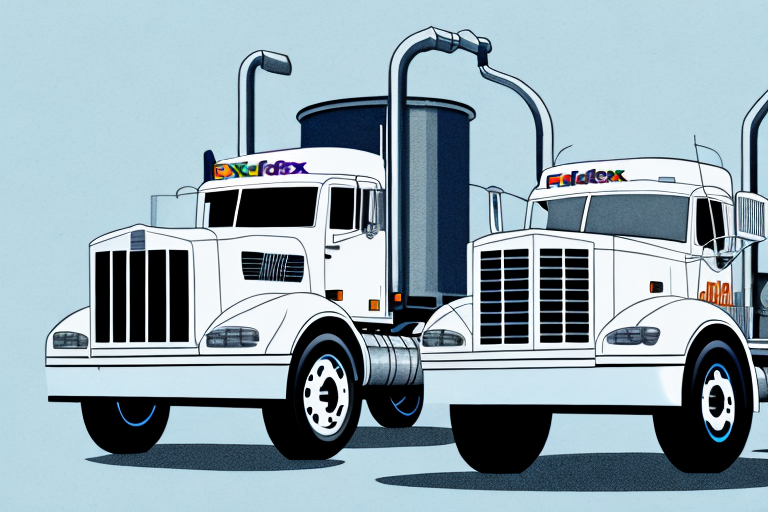Understanding FedEx's Fuel Surcharge Policy
When shipping packages with FedEx, you might notice a fuel surcharge added to your shipping charges. This additional fee reflects the fluctuating cost of fuel, which significantly impacts shipping rates. In this article, we provide a comprehensive overview of FedEx's fuel surcharge policy, explaining its purpose, calculation method, and its effect on your shipping costs.
What is a Fuel Surcharge and Why Does FedEx Charge It?
A fuel surcharge is a fee added to shipping charges to account for the changing price of fuel. FedEx and other shipping providers implement this surcharge to offset the costs associated with fuel, a critical component of transportation. The primary goal of the fuel surcharge is to ensure that FedEx can maintain reliable shipping services despite fuel price volatility.
The surcharge amount varies based on fuel prices, shipment distance, and package weight. Typically calculated as a percentage of the base shipping rate, the fuel surcharge is adjusted weekly or monthly to reflect current fuel costs.
It's important to note that the fuel surcharge is not a profit center for FedEx. Instead, it transparently passes the fluctuating fuel costs to customers, preventing the need for uniform shipping rate increases that would unfairly affect all customers.
The Impact of Fuel Prices on Shipping Rates
Fuel costs are a major factor influencing shipping rates. High fuel prices increase the operational costs of vehicles, planes, and other transportation equipment essential for shipping. Consequently, these increased costs are passed onto customers to maintain the profitability and sustainability of shipping services.
Fluctuating fuel prices also affect the demand for shipping services. When fuel prices rise, customers might opt for alternative shipping methods or delay shipments, potentially reducing the demand for services and impacting the profitability of shipping providers. Conversely, lower fuel prices can boost demand, leading to increased shipping volumes and potentially higher profits for companies like FedEx.
According to the U.S. Energy Information Administration (EIA), fuel costs accounted for approximately 20% of total shipping expenses in 2023, highlighting the significant impact of fuel prices on shipping rates.
How FedEx Calculates Fuel Surcharges
FedEx calculates its fuel surcharge by considering the total weight of your package and the current fuel price compared to a baseline price. The surcharge rate is updated weekly and is determined based on a fuel price index published by the U.S. Energy Information Administration (EIA). If the current fuel price exceeds the baseline, FedEx applies a surcharge to the shipping rate.
For example, if the baseline fuel price is $3.00 per gallon and the current price is $3.50 per gallon, FedEx will adjust the surcharge proportionally to cover the additional fuel cost. This dynamic approach allows FedEx to accurately reflect real-time fuel price changes in its shipping rates.
It's essential to understand that the fuel surcharge is not a government-imposed tax but a fee implemented by FedEx to manage operational costs effectively.
Strategies to Reduce the Impact of Fuel Surcharges
Minimizing the impact of fuel surcharges on your shipping costs can lead to significant savings. Here are several strategies to consider:
- Consolidate Shipments: Combine multiple packages into a single shipment to reduce the number of packages and, consequently, the total fuel surcharge.
- Choose Fuel-Efficient Shipping Options: Opt for ground shipping over air shipping when possible, as it typically incurs lower fuel surcharges.
- Negotiate Contracts: Establish contracts with FedEx that include favorable fuel surcharge terms, especially if you have high shipping volumes.
- Monitor Fuel Prices: Keep an eye on fuel price trends and adjust your shipping schedule to take advantage of lower surcharge periods.
- Alternative Transportation Modes: Consider using rail or sea transportation for long-distance shipments, which are generally more fuel-efficient than trucks or planes.
- Adopt Sustainable Practices: Utilize hybrid or electric vehicles for local deliveries to reduce fuel consumption and lower fuel costs.
Implementing these strategies can help you manage shipping costs more effectively and reduce the financial impact of fuel surcharges.
Checking the Current FedEx Fuel Surcharge Rates
To stay informed about the current fuel surcharge rates for FedEx shipping, visit the official FedEx Fuel Surcharge Page. The surcharge rates are updated weekly, ensuring you have the most accurate information for budgeting your shipping costs.
Fuel surcharges vary based on package weight and destination. Heavier packages and longer shipping distances typically incur higher surcharges. Additionally, FedEx offers discounts on fuel surcharges for high-volume customers and those enrolled in their loyalty programs. Check if you qualify for these discounts to optimize your shipping expenses.
Comparing Fuel Surcharges Among Different Shipping Providers
Comparing fuel surcharges across various shipping providers can help you identify the most cost-effective option for your shipping needs. While FedEx's fuel surcharge policy is similar to other carriers like UPS and DHL, the rates and calculation methods may differ.
Some providers may offer discounts or waive fuel surcharges for specific shipment types or high-volume customers. It's crucial to inquire about these options and consider them when evaluating different shipping services. Remember to compare other factors such as shipping speed, package size and weight limitations, and destination coverage to make a well-informed decision.
For a detailed comparison, refer to the Consumer Reports Shipping Guide, which provides comprehensive insights into various shipping providers' surcharge policies and overall service quality.
Negotiating Lower Fuel Surcharges with FedEx
If you frequently ship large volumes with FedEx, you might have the opportunity to negotiate lower fuel surcharges. Contact FedEx's customer service or your account manager to discuss potential volume discounts or customized pricing arrangements tailored to your business needs.
Additionally, consider alternative shipping methods offered by FedEx, such as ground shipping over air shipping, to benefit from lower fuel surcharges. Consolidating multiple packages into a single shipment can also help reduce overall surcharge costs.
Engaging in regular discussions with FedEx about your shipping patterns and needs can lead to more favorable surcharge terms, ultimately lowering your shipping expenses.
The Evolution of FedEx's Fuel Surcharge Policy
FedEx introduced fuel surcharges in 2001 as a response to rising fuel costs. Since then, the company has made several adjustments to its policy, including changes to the baseline fuel price and the calculation methodology. In 2015, FedEx began adjusting fuel surcharge rates weekly instead of monthly to better respond to rapid fuel price fluctuations.
FedEx has also implemented additional surcharges, such as peak season surcharges, to manage increased shipping volumes during high-demand periods. Furthermore, the company has invested in fuel-efficient aircraft and vehicles, alternative fuels, and optimized delivery routes to reduce fuel consumption and its carbon footprint.
These initiatives not only help to lower operational costs but also demonstrate FedEx's commitment to environmental sustainability.
Fuel Efficiency and Its Role in Reducing Shipping Costs
Improving fuel efficiency is a key strategy for FedEx to reduce shipping costs and mitigate the impact of fuel surcharges. The company has invested in electric vehicles, biofuels, and other sustainable transportation options to decrease its reliance on traditional fuel sources.
FedEx's commitment to fuel efficiency includes initiatives like optimizing delivery routes using advanced analytics, investing in fuel-efficient aircraft, and exploring alternative energy sources. These efforts help lower fuel consumption, reduce operational costs, and support environmental sustainability.
According to the FedEx Sustainability Report, the company's investments in fuel efficiency have resulted in a 10% reduction in fuel consumption over the past five years.
Debunking Common Misconceptions About FedEx's Fuel Surcharge Policy
Several misconceptions surround FedEx's fuel surcharge policy. One common belief is that the surcharge is merely a profit-increasing mechanism. In reality, the fuel surcharge is a necessary fee designed to offset the variable costs of fuel, ensuring that shipping rates remain fair and reflect actual operational expenses.
Another misconception is that the fuel surcharge is a fixed fee that cannot be negotiated. However, customers with high shipping volumes or long-term contracts can negotiate favorable surcharge terms tailored to their specific needs.
Understanding the true purpose and mechanics of the fuel surcharge can help customers make informed decisions and manage their shipping budgets effectively.
Handling Discrepancies in Fuel Surcharges
If you believe that a FedEx fuel surcharge on your bill is incorrect or unjustified, it's important to address the issue promptly. Start by reviewing your shipment details and the current fuel surcharge rates on the FedEx website.
If discrepancies persist, contact FedEx customer service to discuss your concerns. Provide detailed information about your shipment, including weight, destination, and the applicable surcharge rate. FedEx has a dispute resolution process in place and may offer adjustments or clarifications based on your case.
Maintaining clear communication with FedEx can help resolve any issues related to fuel surcharges and ensure accurate billing.
Best Practices for Managing Shipping Costs and Minimizing Fuel Surcharges
Effectively managing shipping costs involves a combination of strategic planning and proactive measures. Here are some best practices to minimize the impact of fuel surcharges:
- Consolidate Shipments: Reduce the number of shipments by combining multiple packages, thereby lowering total fuel surcharges.
- Select Fuel-Efficient Shipping Options: Choose ground shipping over air when possible to take advantage of lower fuel surcharges.
- Negotiate with FedEx: Engage with FedEx to negotiate favorable surcharge terms, especially if you have high shipping volumes.
- Monitor Fuel Prices: Stay informed about fuel price trends and adjust your shipping schedules to benefit from lower surcharge periods.
- Implement Sustainable Practices: Use fuel-efficient vehicles and optimize delivery routes to reduce fuel consumption and costs.
By adhering to these best practices, you can effectively manage your shipping expenses and minimize the impact of fuel surcharges on your overall costs.
Future Trends in Shipping and Their Impact on Fuel Surcharge Policies
The shipping industry is continually evolving, with several emerging trends that could influence FedEx's fuel surcharge policy in the future:
- Increased Fuel Efficiency Standards: Stricter regulations on fuel efficiency may lead to lower operational costs and potentially reduced fuel surcharges.
- Growth of E-Commerce: The surge in e-commerce demands more efficient and scalable shipping solutions, which could impact surcharge calculations.
- Advancements in Shipping Technologies: Innovations such as autonomous vehicles and drone deliveries may change fuel consumption patterns and influence surcharge policies.
- Adoption of Alternative Fuels: The use of biofuels and electric-powered transportation could reduce dependency on traditional fossil fuels, affecting fuel surcharge structures.
FedEx is likely to adapt its fuel surcharge policy to accommodate these trends, maintaining its commitment to efficiency and sustainability while ensuring fair pricing for customers.
Staying Informed About Changes to FedEx's Fuel Surcharge and Shipping Fees
To keep abreast of changes to FedEx's fuel surcharge policy and other shipping fees, regularly visit the official FedEx Fuel Surcharge Page. Additionally, consider subscribing to FedEx newsletters or alerts to receive timely updates.
Staying informed allows you to adjust your shipping strategies proactively, ensuring you can manage costs effectively and maintain a competitive edge in your business operations.
Overall, understanding FedEx's fuel surcharge is crucial for managing your shipping expenses and ensuring reliable package delivery. By staying informed about surcharge calculations, monitoring fuel prices, and implementing cost-saving strategies, you can minimize the financial impact of fuel surcharges and maintain efficient shipping operations.




















